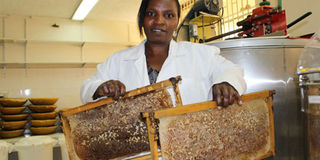Coming soon: A world class hospital for bees

Beatrice Njuguna, a technician at ICIPE. It emerged that researchers at the Nairobi-based International Centre for Insect Physiology and Ecology (Icipe) have discovered a new approach that could be used to control malaria. FILE PHOTO |
What you need to know:
- Part of the mandate of the 10 scientists running the bee project is coming up with bio-pesticides, which will protect bees without harming the environment.
- ICIPE charges $250 for registration but interested farmers from out of Nairobi would have to make their own accommodation arrangement for the 10 days the programme takes.
The International Centre for Insect Physiology and Ecology (ICIPE) campus in Kasarani, Nairobi is always as busy as a beehive.
With cluster upon cluster of buildings, a fuel station, a sprawling cafeteria, floor upon floor of offices, research stations and exhibition rooms, with additional buildings under construction, it is a veritable city with in a city.
Prof Suresh Kumar Raina, principal research scientist and team leader on the Bee Health Project, is animated as he talks about bees.
He took Seeds of Gold round a two-storey African Reference Laboratory for Bee Health currently under construction, meticulously explaining how each bee sub-species and race will have its own surveillance room, indicating some of the high-level medical, mapping and surveillance equipment that will be fitted before the September inauguration.
Pesticides, exotic pests, lack of information related to bee health and poor bee keeping methods have in the past few years threatened the survival of bees.
Prof Raina, originally from the green foothills of Kashmir, explains where bees come in with regard to food security.
“Seventy per cent of crops are pollinated by bees and other pollinators, therefore without them, there is no food. That’s why the US and the UK are putting so much money towards bee health research.”
This new research lab aims to continually monitor the bee health situation in West, Central and East Africa.
Part of the mandate of the 10 scientists running the bee project is coming up with bio-pesticides, which will protect bees without harming the environment.
Extending itself from its urban dwelling, the apiary project currently reaches out to farmers across the country, with bee keeping projects in Mwingi, Kakamega, West Pokot, Isiolo, Mt Kenya, Kitui, Machakos, Baringo and Mombasa. The organisation runs four training programmes a year, one after every three months.
The project trains on hive setting, management of bees, harvesting honey and packaging. “We also teach on how to rear and breed queen bees for production, which helps the hive grow faster. For farmers producing a lot, the researchers can connect them to interested markets,” says Prof Raina.
Bee sub species
Carpenters are another group that benefit as they are taught how to make hives specific for the different bee sub-species.
ICIPE charges $250 for registration but interested farmers from out of Nairobi would have to make their own accommodation arrangement for the 10 days the programme takes.
More than 30,000 farmers have gone through ICIPE’s programmess over the past 15 years.
“Kakamega farmers are being trained on stingless bees right now, which give good honey for medicine. We’re also training farmers on keeping carpenter bees, which are good for pollination.”
Inside the apiary project offices, Beatrice Njuguna, a technician who oversees the production of honey says, “Each frame gives 1.5 to 2.5kg of honey. To extract it, you put the frame into this grinder (she points at a steel cylinder) and then this other one (also steel, slightly larger than the first) where the raw honey is warmed and filtered.”
Can farmers make money from pollination using bees? “Definitely, they increase their yields. For example, green grams farmers in Mwingi, who keep bees get more produce compared to those who don’t. Also with tomato, avocado, pumpkin and sunflower, you get 15 to 20 per cent more crops. We’ve done experiments and seen this. With some like onions more specifically, you get 40 per cent more,” Prof Raina avers.
What about honey, how much on average can a farmer make from keeping bees?
“With four hives, one can make 60 to 80 kg of honey a year. Each kilo costs about Sh350 to Sh450. For stingless honey, they get Sh450 to Sh600 per kilo. That’s already a good profit.”




